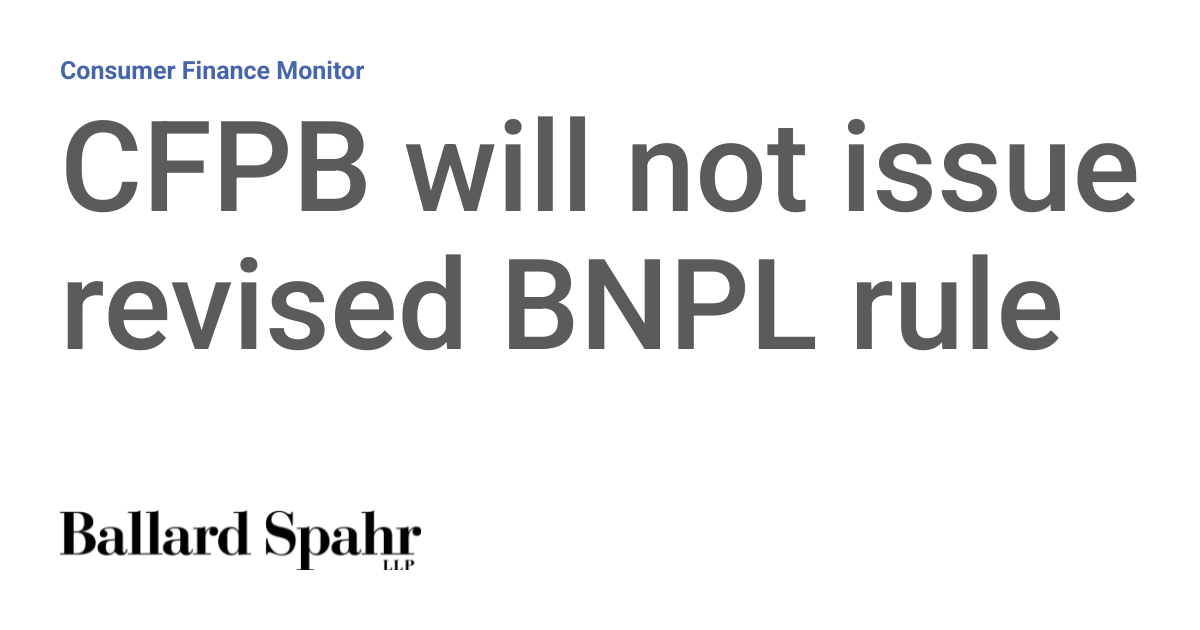
CFPB will not issue revised BNPL rule
How did your country report this? Share your view in the comments.
Diverging Reports Breakdown
CFPB will not issue revised BNPL rule
The CFPB has withdrawn its Buy Now, Pay Later rule. The rule applied ill-fitting open-end credit regulations to BNPL products, the bureau said. The Financial Technology Association filed a lawsuit to have the rule rescinded. The bureau agreed that the rule should have gone through the formal rulemaking process, it said.. New York recently signed legislation that imposes new licensing requirements on companies offering BN PL services. The New York law, signed by Gov. Kathy Hochul, imposes new requirements on. companies offeringBNPL services on BNNPL places, such as banks, credit unions, credit card companies, and other financial institutions. The law also applies to short-term, closed-end installment products that typically carry no finance charge, the Bureau said. It said that states may act to fill the perceived gap in BnPL regulation.
“The Bureau has determined that it does not intend to reissue the BNPL Interpretive Rule because it was procedurally defective and the interpretation included therein applied ill-fitting open-end credit regulations to BNPL products, which are generally structured as closed-end loans,” the CFPB said, in a status report it submitted in a lawsuit filed by the Financial Technology Association.
The bureau added that the inappropriately applied “open-end credit regulations [provided] little benefit to consumers and [placed a] substantial burden [on] regulated entities.”
The CFPB had said in March that it intended to revoke the BNPL interpretive rule.
The interpretive rule provided that certain BNPL programs involved “digital user accounts” and that those digital user accounts were “credit cards,” making the BNPL providers “card issuers.”
As a result, many BNPL providers were subject to many of Regulation Z’s open-end credit provisions. These Regulation Z requirements included account-opening disclosures, billing statements, change in terms disclosure, payment processing, treatment of credit balances, issuance of cards, liability for unauthorized use, merchant disputes, billing disputes, crediting of returns, advertising, and, as the CFPB noted in a footnote, potentially application and solicitation disclosures.
Given the extensive change in interpretation and requirements imposed on BNPL providers, the FTA argued that the Administrative Procedure Act required the CFPB to treat the rule as a legislative rule, and, therefore, to go through the notice and comment process in issuing the rule. Instead, the CFPB had issued it as an interpretive rule without going through that formal process.
The FTA also alleged that the rule exceeded the CFPB’s statutory authority by imposing obligations beyond those permitted by TILA and by contravening TILA’s effective-date requirement for new disclosure requirements.
Finally, the FTA argued that the interpretive rule was arbitrary and capricious under the Administrative Procedure Act because the CFPB overlooked that certain TILA requirements with respect to credit cards are a poor fit for BNPL products and because the CFPB did not give BNPL providers sufficient time to come into compliance.
The CFPB agreed that the rule should have gone through the formal legislative rulemaking process. “Any change to include closed-end BNPL credit in the definition of credit card should have been made through notice and comment rulemaking procedures to articulate any such distinctions or, as necessary, rescind or modify the existing Regulation Z commentary,” the CFPB said.
The bureau continued, “The BNPL Interpretive Rule opined that for closed-end BNPL credit, a “BNPL digital user account” is a credit card, despite not offering any interpretive reason why that would be so when account numbers are not credit cards.”
The bureau also agreed that the credit card requirements that would have been applicable were ill-suited for BNPL products.
“The Interpretive Rule, however, extended these provisions to BNPL loans even though they are short-term, closed-end installment products that typically carry no finance charge,” the CFPB said. “As a result, BNPL consumers would gain limited value from the mandated disclosures. In addition, the timing requirements for periodic statements, in particular—also designed for revolving credit—are mismatched to the repayment schedule of the traditional BNPL loan model, imposing significant operational burdens on BNPL providers who would have had to comply with the now-withdrawn Interpretive Rule.”
However, as we previously reported, states may act to fill the perceived gap in BNPL regulation. For example, New York is taking a different approach to BNPL. Gov. Kathy Hochul recently signed legislation that, among other things, imposes new licensing requirements on companies offering BNPL services and places substantive limitations on BNPL products
Source: https://www.consumerfinancemonitor.com/2025/06/20/cfpb-will-not-issue-revised-bnpl-rule/
